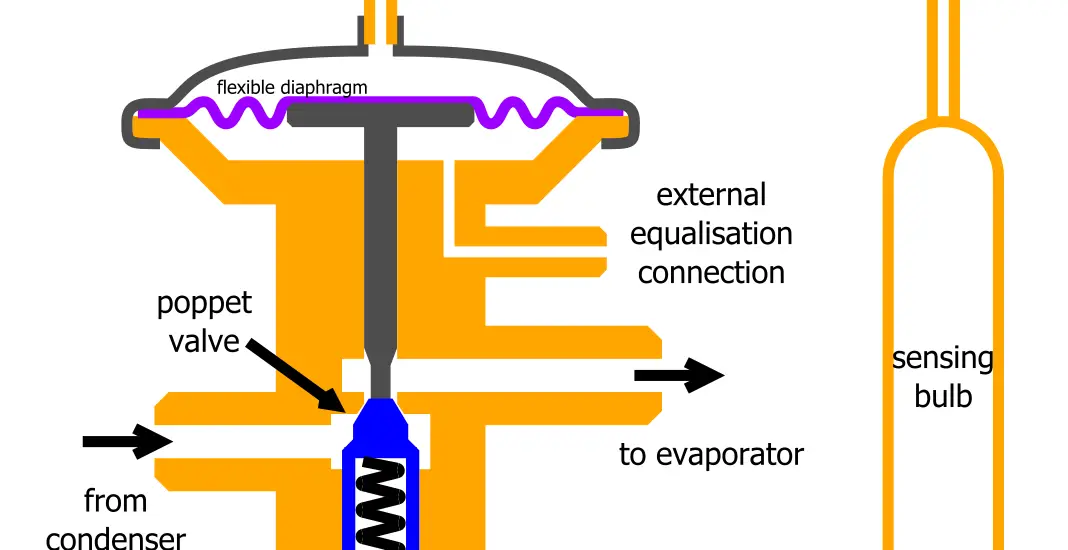“What is expansion valve?” is a question that many people new to thermal systems or refrigeration might ask. This article will provide you with a comprehensive understanding of the expansion valve.

Table of Contents
What is Expansion Valve in Refrigeration System?
The expansion valve in a refrigeration system is a critical component that precisely controls the flow of refrigerant into the evaporator. It operates by sensing changes in temperature and pressure at the evaporator’s outlet, allowing it to adjust the refrigerant flow accordingly. The valve’s ability to precisely manage this flow is vital for the following reasons:
Temperature Control: By regulating the amount of refrigerant, the expansion valve maintains the desired temperature within the system. It ensures that the refrigeration cycle operates optimally, avoiding excessive cooling or heating.
Efficiency: By delivering the right amount of refrigerant, the valve ensures that the system operates efficiently, conserving energy and reducing operating costs.
Protection: By preventing excessive refrigerant flow, it protects the compressor and other components from potential damage due to high pressure.
In essence, the expansion valve is indispensable in a refrigeration system, contributing to performance, efficiency, and reliability.
Expansion Valve Definition
The expansion valve is a sophisticated device designed to regulate the refrigerant’s flow rate entering the evaporator coil. It can be further understood through its main components and their functions:
Temperature Sensing Bulb: Attached to the evaporator’s outlet, it senses the temperature and transmits a pressure signal to the diaphragm.
Diaphragm: Responds to pressure signals from the sensing bulb and adjusts the valve’s opening, controlling the flow of refrigerant.
Spring: Works in conjunction with the diaphragm to open or close the valve.
These components work together to maintain a delicate balance in the refrigeration cycle, providing consistent cooling or heating.
Definition of Expansion Valve in Different Systems
An expansion valve usage extends beyond refrigeration systems to include various applications:
Air Conditioning: In AC systems, the expansion valve plays a similar role to that in refrigeration, controlling the refrigerant flow to maintain comfortable room temperatures.
If you’re looking for a portable air conditioner, we recommend this BLACK+DECKER 8,000 BTU Portable Air Conditioner on Amazon.
Heat Pumps: The valve balances the flow of refrigerant between the heating and cooling cycles, ensuring optimal performance.
Industrial Cooling: Used in factories to control the cooling process for machinery and products, contributing to quality control and energy efficiency.
The diverse applications of the expansion valve demonstrate its universal importance in thermal control processes.
Check out these other related articles…
Bad Expansion Valve Pressures: A Complete Guide
5 Expansion Valve Stuck Open Symptoms: A Comprehensive Guide
4 Stuck Expansion Valve Symptoms: A Complete Guide
Clogged Expansion Valve Symptoms: A Complete Guide
How to Test Expansion Valve in 6 Easy Steps
Expansion Valve Troubleshooting: 4 Easy Steps to Follow
Electronic Expansion Valve Controller: A Comprehensive Guide
Types of Expansion Valves
Expansion valves come in various types, each designed to meet specific requirements. The most common types include:
Thermostatic Expansion Valves (TXV): These are the most common and are used in a wide variety of systems. They are known for precision and reliability.
Capillary Tubes: Often used in smaller systems, these regulate the flow of refrigerant by using a thin tube, providing a simple and cost-effective solution.
Automatic Expansion Valves (AXV): These valves automatically adjust to the pressure changes, maintaining a constant pressure in the evaporator.
Electronic Expansion Valves (EXV): These modern valves use electronic controls to adjust the refrigerant flow with high accuracy, often used in complex and large-scale systems.
